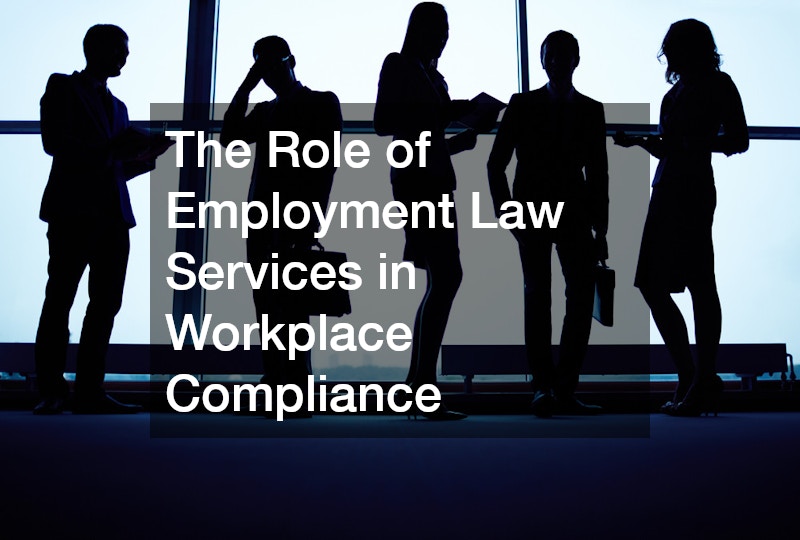The intricate landscape of employment law is evolving continuously, reflecting changes in societal norms, the economy, and the political environment. In this context, employment law services are indispensable for organizations striving to achieve workplace compliance. These services play a fundamental role in navigating the complex regulatory framework that governs employer-employee relationships, minimizing legal risks, and fostering a fair and equitable workplace environment.
This article delves into the pivotal role of employment law services, exploring how they aid employers in maintaining compliance, the challenges involved, and effective strategies for implementation.
1. What Are Employment Law Services?
Employment law services encompass a range of professional services provided by legal experts specializing in labor laws and regulations. These services include consultation, compliance audits, policy drafting, and representation in legal proceedings. Legal professionals help interpret employment laws, ensuring that businesses understand their obligations under nationwide and state regulations. Moreover, they offer insights into employee rights, discrimination, wages, and benefits regulations, making them crucial partners in maintaining compliant workplace practices.
The scope of employment law services is expansive, addressing issues such as wrongful termination, workplace harassment, discrimination cases, and wage and hour disputes. By availing these services, businesses can avoid costly litigation and reputational damage. Furthermore, employment law services include training programs to educate management and employees about legal requirements and best practices, ensuring that all stakeholders are informed and proactive in adhering to legal standards.
2. How Do Employment Law Services Ensure Workplace Compliance?
Employment law services ensure workplace compliance through a multifaceted approach. One primary method is conducting comprehensive audits of existing policies and procedures, identifying areas where the company may fall short of legal standards. These audits help detect potential compliance issues before they escalate into serious legal challenges, allowing organizations to address them proactively.
Additionally, employment law services devise and implement effective compliance programs tailored to the unique needs of a business. These programs often include developing clear, written policies on discrimination, harassment, leaves of absence, and employee conduct, which are essential for guiding workplace interactions and maintaining a respectful and inclusive environment. By keeping policies updated in response to legislative changes, companies can continuously protect themselves against legal vulnerabilities.
3. Why Is Employment Law Essential for Employers?
Employment law is crucial for employers as it provides a legal framework that governs the relationship between employers and employees. Compliance with these laws not only helps avoid legal disputes but also promotes a fair and healthy working environment that can lead to increased productivity and staff retention. Adhering to employment law reinforces an organization’s commitment to ethical practices and corporate responsibility.
Furthermore, employment law helps protect employers from potential liabilities and reputational damage associated with non-compliance. By being proactive in implementing and following employment law guidelines, employers can prevent costly litigation and penalties that could arise from wrongful dismissal claims, workplace discrimination, and other legal infractions. Offenses can result in significant financial losses and tarnish a company’s public image, making compliance paramount.
4. What Challenges Are Commonly Faced in Employment Law Compliance?
One of the significant challenges in employment law compliance is keeping pace with the ever-changing legal landscape. Labor laws frequently undergo amendments at both national and local levels, necessitating constant vigilance and adaptation from employers to remain compliant. This requires ongoing monitoring of legislative changes and revising company policies accordingly, which can be resource-intensive.
Another challenge is the complexity of legal language and its interpretation. Compliance often involves navigating intricate legal texts and understanding their implications from a business perspective. Many organizations struggle with accurately interpreting these texts, which can lead to unintentional violations. The intricacy of legal requirements demands specialized knowledge that not all businesses possess internally, hence the reliance on external employment law services.
5. How Can Employers Effectively Implement Employment Law Services?
To implement employment law services effectively, employers must begin by conducting a thorough assessment of their current compliance status. Identifying areas of risk or non-compliance will provide a foundation for tailored action plans that address specific legal needs. Engaging with experienced legal professionals can facilitate this process, offering expert insight and guidance.
Creating an inclusive, transparent culture that prioritizes legal compliance is vital. Leadership must demonstrate a commitment to upholding employment laws, setting a precedent for the rest of the organization. Regularly scheduled training sessions for both management and staff on the latest legal updates, ethical practices, and policy adherence should be a staple of this approach. Such initiatives not only educate but also reinforce the importance of legal compliance as a shared organizational responsibility.
Employment law services play an indispensable role in workplace compliance, offering expert guidance to navigate the complexities of labor laws and regulations. Through comprehensive compliance strategies and tailored legal support, these services empower employers to uphold their legal obligations, protect their businesses from legal disputes, and foster a fair and respectful workplace. As the legal landscape evolves, so too must employers’ approaches to compliance, highlighting the need for continuous education, policy adaptation, and collaboration with skilled legal professionals. By prioritizing legal compliance and ethical practices, businesses can build a resilient foundation for long-term success.


